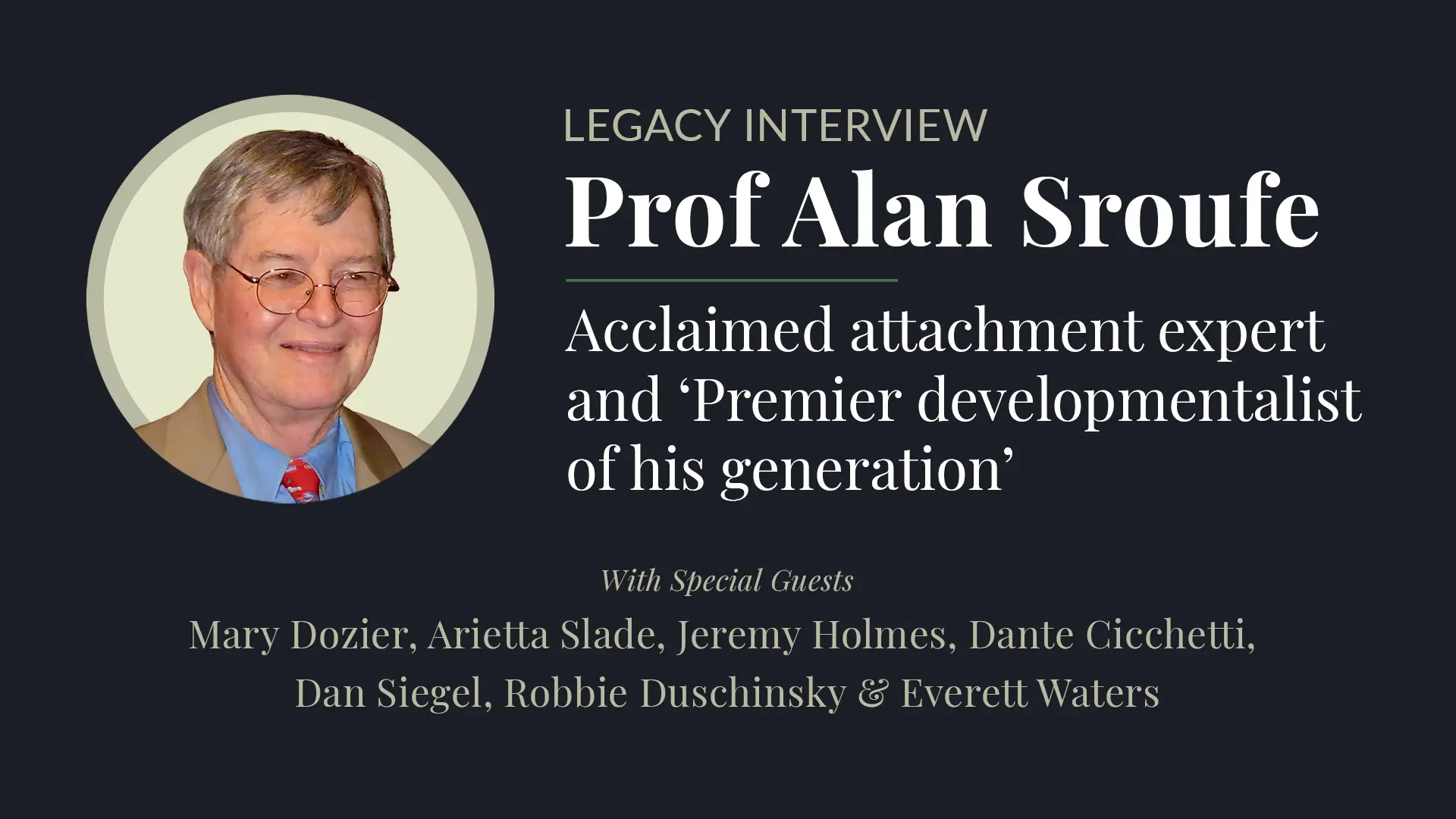June 2025
Stephen Porges and Sue Carter Live Legacy Interview
Stephen Porges and Sue Carter Live Legacy Interview
Join us for a special Live Legacy Interview exploring the life and work of Dr Stephen Porg...

– Watch this recording for £39 includes a 2 hour CEU/CPD certificate –
With Special Guests
“I wanted to let you know that of all the CE courses I have taken over the last three years the Alan Sroufe interview was the best—far above all the others. Thank you for creating this series.”
This Legacy Interview celebrates the remarkable contributions of Professor Alan Sroufe, a pioneering figure in the field of attachment research and developmental psychology. As Professor Emeritus at the University of Minnesota Institute of Child Development, Alan’s groundbreaking Minnesota Longitudinal Study of Risk and Adaptation provided compelling evidence for the critical role of early attachment relationships in shaping human development across the lifespan.
Joined by an renowned group of collaborators and researchers influenced by his work, this interview offers a captivating exploration of Alan’s significant impact on our understanding of attachment, relationships, and developmental trajectories. From his groundbreaking empirical research to his transformative insights for clinical interventions, Alan’s legacy is a testament to the power of attachment theory in illuminating the human experience.
 Clinical psychologist, researcher, and professor of clinical child psychology at the Yale Child Study Center, recognised for her contributions to attachment theory, psychoanalysis, and infant mental health.
Clinical psychologist, researcher, and professor of clinical child psychology at the Yale Child Study Center, recognised for her contributions to attachment theory, psychoanalysis, and infant mental health.
Arietta shares how Alan’s work has shaped her understanding of attachment and its role in explaining children’s anxiety as a fear of losing contact with their parents. She discusses her work developing interventions to enhance parental reflective functioning, helping parents become more sensitive and aware of their children’s feelings and mental states.
 Chair of Child Development and Professor in the Department of Psychological and Brain Sciences at the University of Delaware, celebrated for her work on the Attachment and Biobehavioral Catch-up (ABC) parenting program.
Chair of Child Development and Professor in the Department of Psychological and Brain Sciences at the University of Delaware, celebrated for her work on the Attachment and Biobehavioral Catch-up (ABC) parenting program.
Mary discusses how Alan’s work has influenced her Attachment and Biobehavioral Catch-up (ABC) parenting programme, which aims to change parenting behaviours to promote secure attachment. She emphasises the importance of targeting specific behaviours based on attachment theory, such as nurturing the distressed child, being attuned to the child’s signals, and avoiding frightening or intrusive behaviours.
 Professor Emeritus of Psychology at Stony Brook University and co-author with Mary Ainsworth of the influential volume “Patterns of Attachment,” who worked closely with Alan as a graduate student.
Professor Emeritus of Psychology at Stony Brook University and co-author with Mary Ainsworth of the influential volume “Patterns of Attachment,” who worked closely with Alan as a graduate student.
Everett reflects on his early collaboration with Alan as a graduate student, working on the Strange Situation procedure and the challenges they faced in establishing the validity and reliability of the measure. He emphasises the excitement and sense of discovery that characterised their work, as well as the close-knit and collaborative nature of their research group.
 Clinical professor of psychiatry at the UCLA School of Medicine and founding co-director of the UCLA Mindful Awareness Research Center, known for his work in interpersonal neurobiology.
Clinical professor of psychiatry at the UCLA School of Medicine and founding co-director of the UCLA Mindful Awareness Research Center, known for his work in interpersonal neurobiology.
Dan discusses how Alan’s work has provided an empirical foundation for understanding the biology of attachment and its impact on brain development. He explains how his own work in interpersonal neurobiology has built upon attachment research to explore the role of relationships in shaping neural integration and regulatory processes.
 Distinguished NHS clinician and author with Arietta Slade of ‘Attachment in Therapeutic Practice’. He is recognised for his work on attachment theory and its application to psychotherapeutic practice.
Distinguished NHS clinician and author with Arietta Slade of ‘Attachment in Therapeutic Practice’. He is recognised for his work on attachment theory and its application to psychotherapeutic practice.
Jeremy reflects on how Alan’s work has allowed attachment theory to be applied in psychoanalytic thinking and clinical settings. He emphasises the importance of the quality of discourse and the creation of a sense of vitality and engagement in the therapeutic process, drawing parallels to the secure attachment relationship.
 Professor Emeritus at the Institute of Child Development, University of Minnesota, and a pioneering figure in the field of developmental psychopathology.
Professor Emeritus at the Institute of Child Development, University of Minnesota, and a pioneering figure in the field of developmental psychopathology.
Dante shares his experiences as a graduate student working with Alan and the significant impact Alan had on his personal and professional development. He discusses their work together on the consequences of child maltreatment and the importance of considering the role of early experiences in shaping developmental trajectories.
 Professor of Social Science and Health at the University of Cambridge, known for his historical analysis of attachment research.
Professor of Social Science and Health at the University of Cambridge, known for his historical analysis of attachment research.
Robbie highlights under appreciated aspects of Alan’s methodology, particularly the use of composite measures to capture the emergent properties of attachment relationships. He emphasises Alan’s contributions to understanding the interplay between individual and family-level processes in shaping development and the regulation of emotion.
For Alan, this groundbreaking research has instilled a sense of optimism, highlighting the potential for a relational perspective grounded in attachment theory to address the challenges facing our world. The gratitude expressed by participants in his longitudinal study serves as a poignant reminder of the transformative power of treating others with dignity and contributing to the betterment of children’s lives.
As we explore into the depths of Alan’s research and its far-reaching implications, this Legacy Interview serves as a compelling testament to the enduring significance of his work in shaping our understanding of human development and fostering well-being across the lifespan.
Alan is in conversation with Jane O’Rourke.
Jane O'Rourke – Founder of MINDinMIND and former award-winning BBC journalist turned Child and Adolescent Psychotherapist. Jane brings a unique skill set to create rich and thoughtful conversations, weaving together the personal and professional threads of her guests' journeys.
This recording was made 28th March 2024
Alan Sroufe asked us to clarify a couple of points he made in the interview related to attachment theory and research.
Read the full text : Two Matters for Clarification – Alan Sroufe
This article presents a strong case for the importance of attachment theory in understanding human development. Alan Sroufe and Daniel Siegel argue that the emotional quality of early attachment experiences is perhaps the single most important influence on development, challenging the views of those who emphasise the role of situational factors, genes, or temperament.
Alan Sroufe and Daniel Siegel conclude by highlighting the clinical relevance of attachment theory, suggesting that therapists can use the power of attachment relationships to cultivate deep and lasting change in their clients.
Read the full article : The Verdict Is In.pdf
This text discusses major findings from research on child development, emphasising the importance of relationships, the coherence and transactional nature of development, and the central role of meaning.
Read the full text : Major Findings
This article “Attachment, Exploration, and Separation: Illustrated by the Behaviour of One-Year-Olds in a Strange Situation” by Mary D. Salter Ainsworth and Silvia M. Bell presents a study of infant-mother attachment using the “Strange Situation” procedure. The authors discuss their findings in the context of an ethological-evolutionary view of attachment theory.
This article underscores the importance of considering attachment behaviour within an ethological-evolutionary framework and of using a wide range of studies to inform the understanding of attachment relationships.
Read the full article : Ainsworth Strange Situation 1969.pdf